Newsletter 2025/2
Newsletter 2025/2 - November 2025
Introduction
It is my pleasure to introduce the autumn edition of the ITLOS newsletter. The Tribunal has made significant progress in both its judicial work and its capacity-building activities, reaffirming its commitment to the peaceful settlement of disputes under the United Nations Convention on the Law of the Sea and also to States, by providing them with support in strengthening their law of the sea expertise.
The Tribunal has continued to advance its judicial docket with diligence. The public hearing in The M/T “Heroic Idun” (No. 2) Case (Marshall Islands/Equatorial Guinea) came to an end on 14 October 2025 and the Special Chamber began its deliberations on the case. Following the agreement of the Parties in The “Zheng He” Case (Luxembourg v. Mexico), the time limit for the filing of the Counter-Memorial of Mexico has been extended by six weeks, to 15 December 2025.
In June, at the thirty-fifth Meeting of States Parties to the Convention, I had the honour of presenting the Tribunal’s Annual Report and updating States Parties on the ongoing work of the Tribunal. In September, the Tribunal adopted amendments to its Guidelines concerning the preparation and presentation of cases, thereby further enhancing procedural clarity and accessibility. That same month, I led a delegation of ITLOS Judges to the International Court of Justice in The Hague for an exchange of views – a valuable opportunity to strengthen cooperation and share perspectives between international judicial institutions.
Capacity-building has remained a central pillar of our work. In September, the Tribunal hosted the fourth ITLOS Workshop for Legal Advisers, generously supported by the Republic of Korea. This edition, focused on African States, brought together participants from across Africa for a week of intensive engagement on dispute settlement under the Convention. In July, we also welcomed a new cohort of fellows under the ITLOS-Nippon Foundation Capacity-Building and Training Programme on Dispute Settlement, continuing a tradition that has equipped numerous young professionals with practical and academic insights into the Tribunal’s work.
Looking ahead, on 31 January and 1 February 2026, the Tribunal will host a symposium, “A Year of Climate Change in International Courts”, organized by the Walther Schücking Institute for International Law at the Christian-Albrechts-University of Kiel and the International Foundation for the Law of the Sea. This event, to be held in the main courtroom of the Tribunal, will bring together judges, counsel and experts to discuss recent decisions on climate change rendered by international courts and tribunals around the world – an important and timely exchange on a matter of global concern.
As we approach the end of 2025, the Tribunal remains fully engaged in its mission to uphold the rule of law in the oceans. Through our adjudicative and educational activities alike, we seek to strengthen confidence in the Convention’s dispute-settlement system and to contribute to a more just and predictable international maritime order. I am deeply grateful to the Judges of the Tribunal, the Registry staff, our partners and all those who continue to support and participate in our work.
I hope that you enjoy reading this newsletter.
With my warmest regards,
Tomas Heidar
President
ITLOS Cases
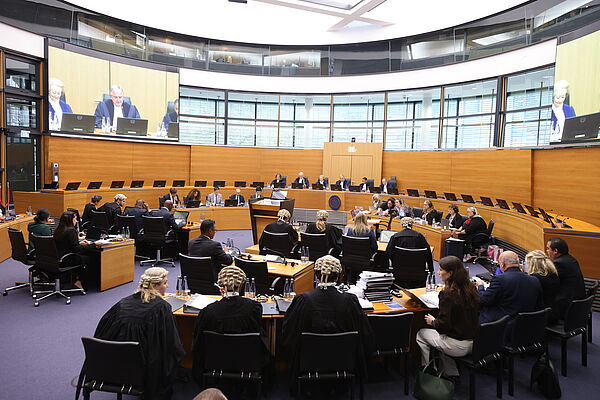
Case No. 32: The M/T “Heroic Idun” (No. 2) Case (Marshall Islands/Equatorial Guinea)
Following the close of the public hearing on 14 October 2025, the Special Chamber is now deliberating on the case.
Case No. 33: The “Zheng He” Case (Luxembourg v. Mexico)
Pursuant to Order 2025/3 of 30 October 2025, the President of the Tribunal, taking into account the agreement of the Parties, extended the time limit for the filing of the Counter-Memorial of Mexico to 15 December 2025.
Interview with Judge Jielong Duan (China)
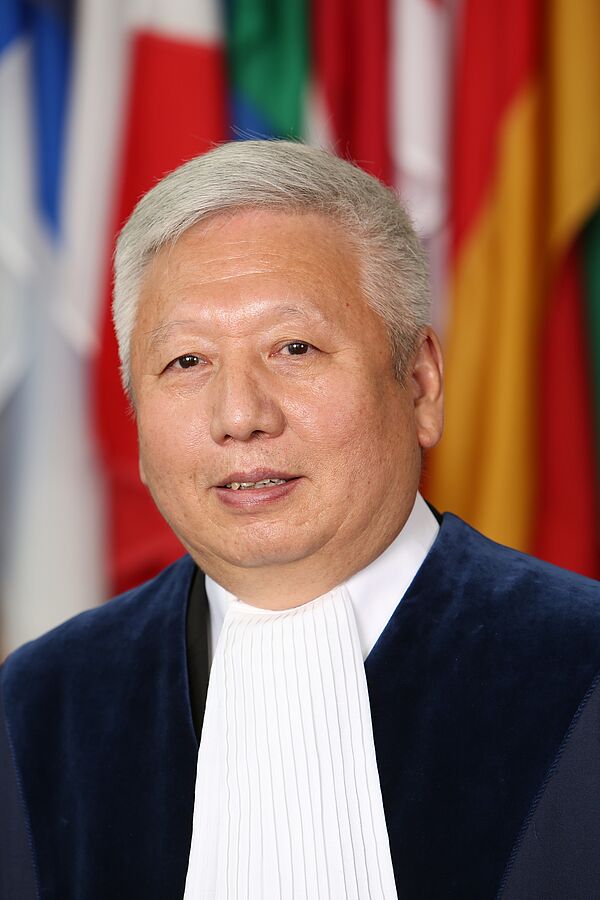
What motivated you to pursue a career in international law, and how did your earlier experiences prepare you for your role as a judge at the Tribunal?
When I was a student at law school, I cultivated a strong interest in international law and wished to build a career in this field. After graduation, I happened to receive the opportunity to serve in the legal department of the Ministry of Foreign Affairs of China. Throughout my 35-year diplomatic career, I went from being an entry-level legal officer to becoming the Ministry’s legal adviser, having closely engaged in numerous multilateral and bilateral meetings and negotiations related to the law of the sea. I have also had productive exchanges and discussions on law of the sea issues with experts, scholars and officials from many countries. Learning from all these experiences, I feel strongly that the law of the sea is vital not only to global peace and stability but also to the development and prosperity of humankind. It is with this reverence that I see the glory and mission of the Tribunal as guardian of the Convention. Serving as a judge of the Tribunal is not only an honour but also a great responsibility.
Since being sworn in as a member of the Tribunal in October 2020, what have been some of the most rewarding aspects of your work as a judge?
As a member of the Tribunal, I am primarily tasked to perform the duties conferred by the Convention in an honest, impartial and conscientious manner. Referred to as a constitution for the oceans, the Convention not only provides a regime universally recognized by the international community but also constitutes a body of rules that requires continuous development. To date, the Tribunal has interpreted and applied provisions of the Convention in a progressive and effective way through contentious and advisory proceedings, settled legal disputes properly and addressed issues of international concern, thereby contributing to the peaceful use of the oceans and the protection of the marine environment. In addition, the Tribunal highly values capacity-building and has made significant efforts to promote the Convention as well as the training of legal experts, which have yielded considerable rewards. I am very proud to take part in propelling these endeavours.
Could you share some of your thoughts on how ITLOS decisions may have helped clarify issues that are of particular importance to States in Asia?
As a judicial body established under the Convention, the Tribunal is mandated to adjudicate cases submitted by States Parties in accordance with the Convention. The judgments and advisory opinions delivered by the Tribunal are relevant and influential insofar as they address law of the sea issues faced by all States and thus should be valued highly and studied thoroughly. States may have various concerns about legal issues relating to the seas and oceans or even different views on the provisions of the Convention. It is exactly this gap that the Tribunal is expected to bridge. I am pleased to see a growing number of Asian countries actively engaging and interacting with the Tribunal, having their contributions placed on and incorporated into the record of cases through participation in the proceedings of the Tribunal.
What advice would you give to young international law practitioners (especially from Asia) who aspire to contribute to the law of the sea – whether as legal advisers, academics, or perhaps even one day as international judges?
In Chinese tradition, the youth are compared to the sun rising in the morning; they are the symbol of vigour and energy and they are brave in their exploration and progress. As the law of the sea regime established by the Convention has developed and has been widely accepted, more and more young international lawyers and scholars across all countries have joined in its practice and study. They are exploring emerging issues, proposing new ideas and helping to build new consensus. It should be acknowledged that the regime set forth by the Convention needs to adapt and to respond to new challenges and developments by means of its interpretation and application. It is my hope that young lawyers and scholars committed to this field will closely follow States’ practice in implementing the Convention, actively participate in the capacity-building programmes of the Tribunal and related mechanisms, and continuously enrich their theoretical and practical expertise. It is my wish and belief that the youth of today will be well prepared to take up the baton to progressively develop the law of the sea regime established by the Convention.
ITLOS Conferences and Events
On 29 September, President Heidar led a delegation of ITLOS Judges on a visit to the International Court of Justice in The Hague. The Judges engaged in discussions and had an exchange of views on matters of interest both to the Tribunal and to the Court.
Capacity Building
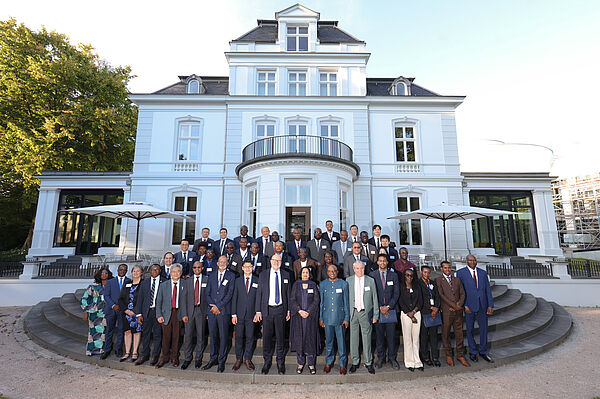
The fourth ITLOS Workshop for Legal Advisers (sponsored by the Republic of Korea) was held at the Tribunal in September and welcomed participants from Algeria, Benin, Burkina Faso, Burundi, Cabo Verde, Chad, Côte d’Ivoire, Egypt, Eritrea, Ethiopia, Ghana, Guinea, Guinea-Bissau, Liberia, Mali, Mauritania, Niger, Nigeria, Rwanda, Sao Tome and Principe, Senegal, Sierra Leone, Somalia, South Sudan, Sudan, Togo, Tunisia and Uganda.
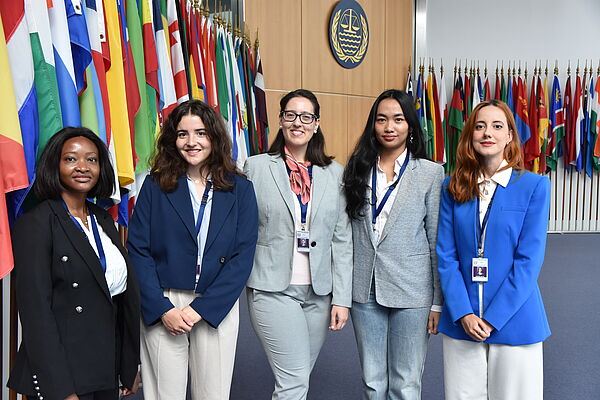
In July, Giselle Amorim Nery de Mesquita (Brazil), Claire Atangana Menyengue (Cameroon), Giolena Exarchou (Greece), Eléonore Guglielmi-Talamon (France) and Febryani Sabatira (Indonesia) joined us for internships in the Legal Office. The 2025-2026 group of ITLOS-Nippon Foundation fellows also arrived at the Tribunal later that month. The seven fellows, John Psalmuel V Chan (Philippines), Brenda Joy Dhliwayo (Zimbabwe), Zulaikha Ibrahim (Maldives), Muneeb Khan (Pakistan), Ama Kokwe Asare Korang (Ghana), Paulo Henrique Reis de Oliveira (Brazil) and Anaïs Rémont (France), after having completed the IFLOS Summer Academy, are currently continuing to participate in an intensive series of lectures, workshops and visits.
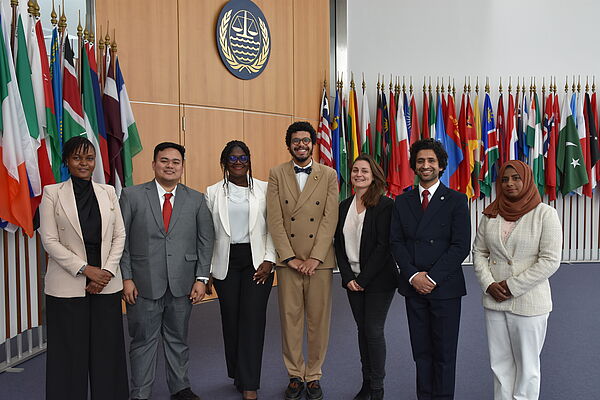
In early October, the last group of interns for 2025 joined the Legal Office. At the end of their three-month internships, Mathilde Abalo (Togo), Martina Marčáková (Slovakia), Harold Minarro-Escalona (Venezuela), Melanie Partalala (Kenya) and Xueer Tang (China) will present the topics of their respective research papers.
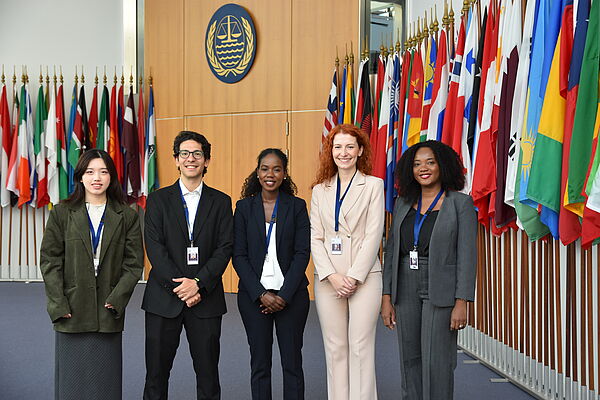
Meet the ITLOS Alumni

Abdou Khadir Diakhate (Senegal), Officer for the Harmonization of Fisheries Policies and Legislation of the Sub-Regional Fisheries Commission (SRFC)
The ITLOS-Nippon Foundation Capacity-Building and Training Programme on Dispute Settlement under the UN Convention on the Law of the Sea was a watershed moment in my life, both academically and professionally.
This programme enabled me to have a greater understanding of the different areas of the law of the sea and especially of dispute-settlement mechanisms such as those provided for by the UN Convention on the Law of the Sea (UNCLOS).
My time at ITLOS in 2015-2016 was a unique opportunity to practice and understand the procedures and functioning of the Tribunal, as well as of other international institutions around the world, including the International Court of Justice and the International Maritime Organization.
I was able to expand my knowledge of the legal issues around maritime areas, delimitation of the marine environment, protection of the marine environment, conservation of fishery resources, the fight against IUU fishing activities, etc. Having such knowledge considerably broadened my doctoral research prospects.
Professionally speaking, this programme played a critical role in steering my career towards senior positions in the field of international law.
The programme’s interdisciplinary and practical approach equipped me with the tools necessary to take on tasks at the Sub-Regional Fisheries Commission (SRFC) – an intergovernmental organization for fisheries cooperation – that concern the harmonization of the fisheries policies and legislation of its seven Member States (Cabo Verde, Gambia, Guinea, Guinea-Bissau, Mauritania, Senegal and Sierra Leone).
As part of my duties at the SRFC, I take part in several international forums on issues primarily pertaining to the harmonization of fishery policies and legislation, the fight against IUU fishing activities and the sustainable management of fisheries resources. Last year, after years of effort, we succeeded in obtaining the signature of the Convention on the Monitoring, Control and Surveillance of Fishing Activities within Maritime Zones under the Jurisdiction of SRFC Member States, its Implementation Protocol, as well as Sub-Regional Fisheries Observer Status. The signature represents the culmination of a process of more than 10 years of consultations, technical discussions and negotiations between SRFC Member States. It testifies to a strong political willingness on the part of our governments to tackle head on the scourge of IUU fishing activities.
Through my participation in the ITLOS-Nippon Foundation programme and the IFLOS Summer Academy, I was also able to establish a solid international network that includes experts, lawyers, diplomats and academics from around the world who are passionate about the law of the sea.
Beyond capacity-building of junior executives, ITLOS also supports States and international organizations in the proper application of UNCLOS. For this reason, on the basis of its experience and the outcome achieved from its request for an advisory opinion from ITLOS on 2 April 2015, the SRFC is considering once again submitting a new request to the Tribunal for an advisory opinion on the compulsory use of the automatic identification system (AIS) by all fishing vessels on the high seas, following on from its high-level side event at the UNOC3 on 12 June 2025, its twenty-second Ordinary Session of the Conference of Ministers held in Dakar, Senegal on 3 July 2025, and the remarkable results obtained in the BBNJ Agreement which will enter into force on 17 January 2026.
Upcoming Events
The Tribunal’s sixty-first administrative session will take place from 16 to 27 March 2026.
A symposium, “A Year of Climate Change in International Courts”, organized by the Walther Schücking Institute for International Law at the Christian-Albrechts-University of Kiel and the International Foundation for the Law of the Sea, will be held on the premises of the Tribunal on 31 January and 1 February 2026. The flyer for the event is available here.

